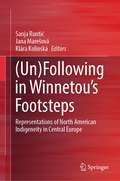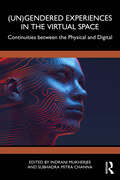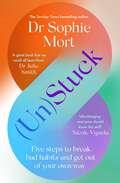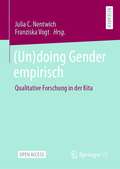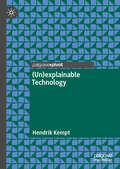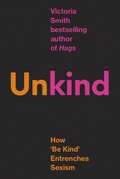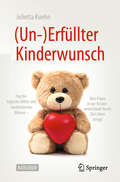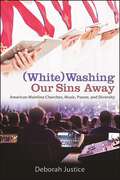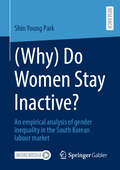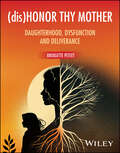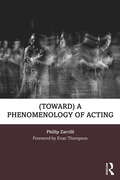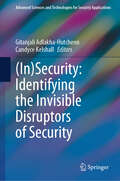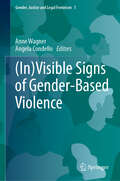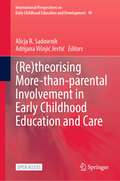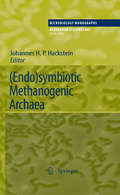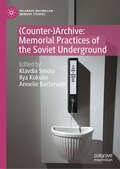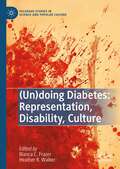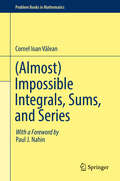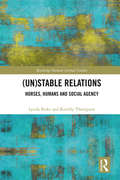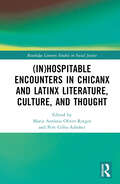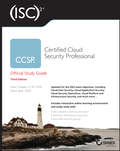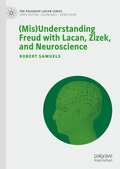- Table View
- List View
(Un)Following in Winnetou’s Footsteps: Representations of North American Indigeneity in Central Europe
by Sanja Runtić Jana Marešová Klára KolinskáThis book examines the ways in which North American Indigenous identity has been (re)imagined, represented, and negotiated in German, Croatian, Italian, Polish, and Czech culture. Employing a cross-disciplinary and comparative approach and drawing on a range of media—from literature, comics, and film to photography, painting, and the performative arts—across different historical and cultural backgrounds, it aims to both contribute innovative scholarship on Indigenous studies in Europe and open a new avenue in the field by focusing on Central European settings that have received little or no critical attention to date. The book’s novelty also comes from its focus on the latest developments in the field, including the “Ravensburger/Winnetou controversy,” which swept across Europe in 2022, echoing the 2017 Canadian debate over Indigenous appropriation and free speech. It seeks to provide a sound reference and lay the groundwork for future scholarship by opening up a conversation on how Indigenous identities have been portrayed in Central European literature and media texts. To this end, it not only addresses generalized expectations about North American Indigenous people underlying (Central) European public discourse and imagination but also questions whether and to what extent some of the ingrained stereotypical views and practices, such as hobbyism, have been challenged in the face of Indigenous resurgence, rapidly changing media and information-sharing realities, and global cultural shifts. The closing interview with Métis playwright, actor, and director Bruce Sinclair underscores one of the book’s key goals—to spark an informed cross-cultural dialogue that will reveal the mechanisms of, as well as the contradictions and tensions inherent in, the politics of Indigenous representation in (Central) European cultural industries and encourage (Central) Europeans to confront their own cultural assumptions and attitudes.
(Un)Gendered Experiences in the Virtual Space: Continuities between the Physical and Digital
by Subhadra Mitra Channa Indrani MukherjeeThis book critically examines the ever-evolving relationship between gender, identity and technology, investigating how identity is shaped, expressed, and contested within virtual environments.It brings together empirical essays from various geographies including Israel, Italy, South Africa, Spain, Brazil, and India, to explore how gender constructs, religiosity, social support structures, ethical discourses, biases and toxicity weave into the digital fabric. While the digital space can build community and open up liberating possibilities, it also retains echoes of real-world social and gender dynamics. The absence of the physical body does not shield virtual spaces from deeply entrenched socio-cultural and political contexts. Through an exploration of different virtual platforms and digital apps like Facebook, WhatsApp, and Tinder among others, the book invites readers to contemplate the boundless possibilities and pressing challenges that arise when gendered experiences converge with the infinite expanse of the virtual space(s). The chapters in this volume offer great analytical insights into these dynamics supported by well-surmised theoretical and methodological backdrops.The book will be of interest to practitioners of social sciences, especially those interested in issues of gender and identity politics as well as research in the digital or virtual space. It will also be a valuable resource for students and researchers of anthropology and sociology.
(Un)Stuck
by Dr Sophie MortFive reasons you&’re stuck – and what to do about it – by the psychologist and Sunday Times bestselling author, Dr Sophie Mort. Do you feel stuck in a rut and that you keep getting in your own way? Or maybe you have an idea of the version of yourself you want to be – self-assured, happy and thriving – but getting there seems impossible? Drawing on her expertise as a clinical psychologist with a masters in neuroscience, Dr Sophie shares the science of habit formation to help you understand your patterns of behaviour and start living the life you want. Packed full of practical tips, exercises, real-life examples and &‘unsticking points&’, Dr Sophie breaks down the five reasons you&’re stuck and gives you the tools to: Break bad habits and cultivate better ones Hack the heuristics that are holding you back Stop self-sabotaging Recognise the unconscious games you play Understand the long-lasting legacy of intergenerational beliefs (Un)Stuck is the must-have guide for becoming the YOU you want to be.
(Un)doing Gender empirisch: Qualitative Forschung in der Kita
by Julia C. Nentwich Franziska VogtIn diesem Open-Access-Sammelband wird angehenden und fortgeschrittenen Forschenden aufgezeigt, wie «doing» und «undoing gender» in Institutionen der frühen Kindheit erforscht und analysiert werden können.Thematisiert werden:zentrale theoretische Konzeptionen von doing und undoing gender verschiedener sozialwissenschaftlicher Theorietraditionenein multimethodischer und multiperspektivischer Ansatz zur empirischen Untersuchung mit qualitativ-ethnographischen ForschungsmethodenVielfältige analytische Zugänge: Raumanalyse, Sequenzanalyse, Dokumentenanalyse, sozialwissenschaftlich hermeneutische Analyse, Diskursanalyse, Analyse organisationaler PraktikenErziehungswissenschaftliche und sozialpsychologische Perspektiven auf Kindertagesstätten als Arbeitsplatz und Organisation, Raum- und Spielangebote, Organisationsentwicklung und eine genderreflektierte Pädagogik
(Un)explainable Technology
by Hendrik KemptThis book explores the issue of (un)explainable technology. As we face technologies, mostly autonomous, machine-learned algorithms (AI) that elude a seamless explanation on how they work (“black boxes”), several issues both from an epistemological as well as ethical perspectives emerge. It is thus not surprising that there are plenty of technological attempts in illuminating the black box as well as philosophical efforts in conceptualizing and re- assessing our concepts of an explanation and understanding, as well emerging ethical questions on how to deal with this unexplainable technology. This book thus offers a succinct and comprehensive, opinionated but fair view on the emerging ethical debate on explainability of AI and its relevance for using AI for different more or less sensitive decision-making procedures. As a short book, the goal is to introduce the reader to the issues at hand while also offering normative arguments from different sides that motivate, complicate, and resolve these issues.
(Un)kind: How 'Be Kind' Entrenches Sexism
by Victoria Smith'Victoria Smith is a brilliant writer who every feminist should read' Sharron Davies'This brilliant book shows how demands for compassion and generosity can be a mask for sexist ideology' Susanna RustinA brilliantly witty and insightful analysis of how kindness culture is used against women. Using the #JustBeKind trend of the 2020s as a starting point, (Un)kind explores how traditional beliefs about women's 'kind' nature have been repackaged for an age that remains dependent - socially, politically, economically - on female self-sacrifice while finding the concept outdated and essentialist. Looking at the various guises under which kindness culture is sold to women and girls - from play to self-help, social justice activism to empowerment - Victoria Smith argues that the pressure on women and girls has not decreased, but instead been incorporated into the 'work' of feminism. (Un)kind analyses the way in which this phenomenon ultimately distorts relationships, harming not just those coerced into performing 'kindness work' but the supposed recipients of their services.Kindness culture supports the backlash against feminism while claiming to represent feminism's - and women's - true nature. It is, at heart, unkind.'Erudite, blisteringly smart and profoundly compassionate... A must-read for anyone hungry to understand the origins and dangers of contemporary exhortations to women to #BeKind, and for everyone who wants to live a feminist life' Dr Rachel HewittPRAISE FOR HAGS'The greatest joy of Hags is its lively erudition . . . eloquent, clever and devastating' The Times 'A book that could not be more necessary' Observer 'Brilliantly witty, engaging and insightful' Scotsman
(Un)kind: How 'Be Kind' Entrenches Sexism
by Victoria Smith'Victoria Smith is a brilliant writer who every feminist should read' Sharron Davies'This brilliant book shows how demands for compassion and generosity can be a mask for sexist ideology' Susanna RustinA brilliantly witty and insightful analysis of how kindness culture is used against women. Using the #JustBeKind trend of the 2020s as a starting point, (Un)kind explores how traditional beliefs about women's 'kind' nature have been repackaged for an age that remains dependent - socially, politically, economically - on female self-sacrifice while finding the concept outdated and essentialist. Looking at the various guises under which kindness culture is sold to women and girls - from play to self-help, social justice activism to empowerment - Victoria Smith argues that the pressure on women and girls has not decreased, but instead been incorporated into the 'work' of feminism. (Un)kind analyses the way in which this phenomenon ultimately distorts relationships, harming not just those coerced into performing 'kindness work' but the supposed recipients of their services.Kindness culture supports the backlash against feminism while claiming to represent feminism's - and women's - true nature. It is, at heart, unkind.'Erudite, blisteringly smart and profoundly compassionate... A must-read for anyone hungry to understand the origins and dangers of contemporary exhortations to women to #BeKind, and for everyone who wants to live a feminist life' Dr Rachel HewittPRAISE FOR HAGS'The greatest joy of Hags is its lively erudition . . . eloquent, clever and devastating' The Times 'A book that could not be more necessary' Observer 'Brilliantly witty, engaging and insightful' Scotsman
(Un-)Erfüllter Kinderwunsch: Psychologische Hilfen und medizinisches Wissen – was Paare in der Kinderwunschzeit ihrem Ziel näher bringt
by Julietta KuehnDie Kinderwunschzeit ist mit einem hohen Leidensdruck und Zukunftsängsten verbunden. Betroffene Paare durchlaufen verschiedene emotionale Entwicklungsphasen und stehen immer wieder vor neuen Herausforderungen. Manchmal ist die Sehnsucht nach einem Baby gar so groß, dass ein Tunnelblick, vermehrtes Grübeln und angstbesetzte Gedanken den Alltag negativ beeinflussen. Wenn Verbissenheit, Trauer, Verzweiflung oder Hoffnungslosigkeit lähmend wirken, kann ein Perspektivenwechsel die Offenheit für alternative Wege stärken.Mit diesem Ratgeber erhalten Sie während dieser facettenreichen, schweren Lebenssituation Unterstützung durch eine erfahrene Medizinerin, Psychotherapeutin und Betroffene. Vor allem wenn reproduktionsmedizinische Maßnahmen in Anspruch genommen werden, ist der Erhalt der körperlichen und geistigen Gesundheit eine Grundvoraussetzung, um diese Zeit möglichst gelassen und ohne Folgeerscheinungen zu überstehen.Auf die Kinderwunschzeit abgestimmte Übungen, konkrete Hilfsangebote und Erfahrungsberichte bieten Ihnen eine lösungsorientierte, mitfühlende Bewältigungshilfe. Loslassen ist in dieser Zeit genauso wichtig, wie die Konkretisierung neuer Wege, damit Sie Ihrem Wunschziel näher kommen.
(White)Washing Our Sins Away: American Mainline Churches, Music, Power, and Diversity
by Deborah JusticeWhat if simply changing musical styles could resurrect social power and religious vitality? By the early 1990s, Christianity was losing ground nationally, and mainline Protestants were trending even Whiter and older than America's overall demographic trajectory. The churches knew they needed to diversify. Yet, many mainline churches focused their energies on the so-called Worship Wars, intense aesthetic and theological controversies running through much of White Christian America. Historically, churches had only supported one musical style; now, many mainline Protestant congregations were willing to risk internal schism to support both Contemporary worship—centered around guitars, praise bands, and choruses—and Traditional worship with its pipe organs, chancel choirs, and hymns. Surely, they thought, musical diversity would broadcast tolerance and bring in new members—perhaps it would even help them regain their historically central role in American society. Based on years of ethnographic research, (White)Washing Our Sins Away explores how American mainline Protestants used internal musical controversies to negotiate their shifting position within the nation's diversifying religious and sociopolitical ecosystems.
(Why) Do Women Stay Inactive?: An empirical analysis of gender inequality in the South Korean labour market
by Shin Young ParkOver the past four decades, South Korea has undergone a remarkable process of economic development, leading to its current status as a renowned centre of innovation and cultural influence. Nevertheless, beneath this outward appearance, a pervasive and profoundly entrenched form of gender inequality pervades the labour market. This is evidenced by the country's continuous ranking at the bottom of the glass ceiling index, a publication of The Economist. This study provides a comprehensive analysis of gender inequality in the Korean labour market, with a particular emphasis on the cultural, political and social dimensions of the issue.
(Woman) Writer: Occasions and Opportunities
by Joyce Carol OatesThese are essays on somewhat general subjects such as the creative impulse, what it means to be a woman writer though the imagination is genderless, and the abundance of "wonderlands" in our culture and invigorating re-explorations of individual writers such as Melville, Emily Dickinson, Charlotte Bronte, R. L. Stevenson and Hemingway.
(dis)Honor Thy Mother: Daughterhood, Dysfunction, and Deliverance
by Bridgette PeteetRelatable stories and psychological insights on how childhood experiences shape us, and how we can reclaim ownership over our lives in the wake of trauma Daughters who have experienced parental abuse, neglect, separation, and other traumas often find themselves in need of support later in life. (dis)Honor Thy Mother explores why our childhoods can be so haunting, and how we can build resilience through growth and healing. Through the lens of the Adverse Childhood Experiences (ACEs), this book presents personal stories—including the author’s own story of growing up with and learning to grow beyond her abusive mother—that bring deep psychological insights to life. This compelling, inventive book helps readers understand their own experiences and those of others. Each chapter weaves together narrative, psychological research, and straightforward advice. The ACEs framework provides a structure for identifying and naming the types of abuse many daughters suffer, along with their associated outcomes, particularly “impostorism.” Abused daughters often turn into high-performing women who struggle with the feeling that their achievements are undeserved. In (dis) Honor Thy Mother, Dr. Bridgette Peteet unpacks this impostor phenomenon and provides resources for women who are ready to move past the past and embrace their own fundamental worth. Drawing from academic literature, research evidence, clinical experience, and personal history, Dr. Peteet reaches recovering adult daughters, clinicians, and scholars alike.
(toward) a phenomenology of acting
by Phillip ZarrilliIn (toward) a phenomenology of acting, Phillip Zarrilli considers acting as a ‘question’ to be explored in the studio and then reflected upon. This book is a vital response to Jerzy Grotowski’s essential question: "How does the actor ‘touch that which is untouchable?’" Phenomenology invites us to listen to "the things themselves", to be attentive to how we sensorially, kinesthetically, and affectively engage with acting as a phenomenon and process. Using detailed first-person accounts of acting across a variety of dramaturgies and performances from Beckett to newly co-created performances to realism, it provides an account of how we ‘do’ or practice phenomenology when training, performing, directing, or teaching. Zarrilli brings a wealth of international and intercultural experience as a director, performer, and teacher to this major new contribution both to the practices of acting and to how we can reflect in depth on those practices. An advanced study for actors, directors, and teachers of acting that is ideal for both the training/rehearsal studio and research, (toward) a phenomenology of acting is an exciting move forward in the philosophical understanding of acting as an embodied practice.
**Missing** (Advanced Sciences and Technologies for Security Applications)
by Gitanjali Adlakha-Hutcheon Candyce KelshallWhat does it take to disrupt security? How does one disrupt the invisibility of insecurity? How does one make the invisible factors that define and impact security visible? For a start, by giving voice to the unheard and the marginalized, engaging non-traditional understandings of security that might bring to light the cracks in our current security infrastructure and expose the insecurities that are hidden in plain sight. These voices include generational, geographic, cultural, ethnic, and gender-based perspectives of insecurity which are ignored, or simply cannot be heard, by traditional notions of security. Presently there is a lack of understanding of the language of nuanced hate being whispered from the ground that inform civil discord. These call for new intrastate actions that need to be taken to make communities safer and building layers of protective resilience into the continuing existence of the state. Unresolved grievances lay the foundation for insecurity and instability for the future at a time when states need cohesiveness more than ever and there are significant invisible insecurities, external to the state, that need to be revealed. The tapestry of interrelationships that enable security within a state requires equity, access, and agency among communities. If we are to achieve this, we must learn to see the invisible, listen to the unheard, and move beyond our static conceptions of security. In so doing we build more resilient societies in the face of a dynamic threat environment and ensure the peaceful continued existence of states. This book is a sounding board for positive disruption, a source for alternative theories, tools, and models to aid mitigation of the whispered threats and the soft violence which accompanies chauvinism of any one way of being. In this edited book the multiplicity of factors that impact security is explored through new lenses to glean insights, such that we are better equipped to prevent harm and protect our security.
**Missing** (Gender, Justice and Legal Feminism #1)
by Anne Wagner Angela CondelloThe edited volume explores the causes, forms, and cultures of gender-based violence in society, including how children are educated, how games, art and even language promote differences, stereotypes, neutrality between men and women. It is a place to reflect on the growing importance of tolerance, diversity and acceptance of others. The book focuses on many facets, whether in a confined or public space, with a series of empirical and theoretical chapters from around the world. The volume provides key contemporary commentary on the changing dynamics of gender-based violence. It unveils a range of contexts and spaces in which gender-based violence happens, showcasing its scale and impact worldwide. The discussions presented in the book encourage a critical reflection on the global pandemic of gender-based violence, prompting a vital question about the sufficiency and effectiveness of responses to this global crisis (Professor Olga Jurasz, The Open University Law School).
**Missing** (International Perspectives on Early Childhood Education and Development #40)
by Alicja R. Sadownik Adrijana Višnjić JevtićThis open access book provides a critical, thought-provoking, and stimulating overview of theories applied worldwide to conceptualise collaborations between early childhood education and children's families. The book starts with a critical reflection on the colonial undertones of parental involvement (PI) and acknowledges a strong political will to improve this aspect of early childhood education and care. The chapters in the book describe and discuss various theories, including the cultural historical wholeness approach, Bronfenbrenner's ecology of human development, the theory of social capital, the theory of collaboration, family-school partnership models proposed by Epstein and Hornby, Bourdieu's social theory, the theory of practice architectures, the discourse/narrative theory, and posthumanism. By proposing the concept of more-than-parents, the authors aim to embrace both the diversity of intergenerational family configurations and the agency of materiality, artifacts, and the involvement of more-than-human actors.
**Missing** (Microbiology Monographs #19)
by Johannes H.P. HacksteinMethanogens are prokaryotic microorganisms that produce methane as an end-product of a complex biochemical pathway. They are strictly anaerobic archaea and occupy a wide variety of anoxic environments. Methanogens also thrive in the cytoplasm of anaerobic unicellular eukaryotes and in the gastrointestinal tracts of animals and humans. The symbiotic methanogens in the gastrointestinal tracts of ruminants and other "methanogenic" mammals contribute significantly to the global methane budget. This monograph deals with methanogenic endosymbionts of anaerobic protists, in particular ciliates and termite flagellates, and with methanogens in the gastrointestinal tracts of vertebrates and arthropods. Further reviews discuss the genomic consequences of living together in symbiotic associations, the role of methanogens in syntrophic degradation, and the function and evolution of hydrogenosomes, hydrogen-producing organelles of certain anaerobic protists.
**Missing** (Palgrave Macmillan Memory Studies)
by Klavdia Smola Ilya Kukulin Annelie BachmaierThis book is the first major study exploring archival and memorial practices of the Soviet unofficial culture. The creation of counter-archives was one of the most important forms of cultural resistance in the Soviet Union. Unofficial artists and poets had to reinvent the possibilities of maintaining art and literature that “did not exist”. Against the background of archival theories and memory studies, the volume explores how the culture of the Soviet underground has become one of the most striking cases of scholarly and artistic (self-)archiving, which – although being half-isolated from the outer world – reflected intellectual and artistic trends characteristic of its time. The guiding question of the volume is how Soviet unofficial culture (de)constructed social memory by collecting, archiving and memorizing tabooed culture of the past and present.
**Missing** (Palgrave Studies in Science and Popular Culture)
by Bianca C. Frazer Heather R. WalkerWhile the 21st century insulin crisis provokes protest and political dialogue, public conception of diabetes remain firmly unchanged. Popular media representations portray diabetes as a condition couched in lifestyle choices. In the groundbreaking volume (Un)doing Diabetes, authors destabilize depictions so powerful, so subtle, and so unquestioned, that readers may find assertions counterintuitive. (Un)doing Diabetes is the first collection of essays to use disability studies to explore representations of diabetes across a wide range of mediums- from Twitter to TV and film, to theater, fiction, fanfiction, fashion and more. This disability studies approach to diabetes locates individual experiences of diabetes within historical and contemporary social conditions. In undoing diabetes, authors deconstruct assumptions the public commonly holds about diabetes, while writers doing diabetes present counter-narratives community members create to represent themselves. This collection will be of interest to scholars, activists, caregivers, and those living with diabetes.
**Missing** (Problem Books in Mathematics)
by Cornel Ioan VăleanThis book contains a multitude of challenging problems and solutions that are not commonly found in classical textbooks. One goal of the book is to present these fascinating mathematical problems in a new and engaging way and illustrate the connections between integrals, sums, and series, many of which involve zeta functions, harmonic series, polylogarithms, and various other special functions and constants. Throughout the book, the reader will find both classical and new problems, with numerous original problems and solutions coming from the personal research of the author. Where classical problems are concerned, such as those given in Olympiads or proposed by famous mathematicians like Ramanujan, the author has come up with new, surprising or unconventional ways of obtaining the desired results. The book begins with a lively foreword by renowned author Paul Nahin and is accessible to those with a good knowledge of calculus from undergraduate students to researchers, and will appeal to all mathematical puzzlers who love a good integral or series.
**Missing** (Routledge Human-Animal Studies Series)
by Kirrilly Thompson Lynda BirkeThis original and insightful book explores how horses can be considered as social actors within shared interspecies networks. It examines what we know about how horses understand us and how we perceive them, as well as the implications of actively recognising other animals as actors within shared social lives. This book explores how interspecies relationships work, using a variety of examples to demonstrate how horses and people build social lives. Considering horses as social actors presents new possibilities for improving the quality of animal lives, the human condition and human-horse relations.
**Missing** (Routledge Literary Studies in Social Justice)
by Maria Antònia Oliver-Rotger and Pere Gifra-AdroherThis volume addresses the notion of (in)hospitality in the culture, literature, and thought of Chicanx and Latinx in the United States. It underscores those “stranger others” against whom nativist fear and state violence are directed: undocumented migrants, refugees, and asylum seekers. Critical analyses focus on the topics of immigration and state violence, hospitality in written and visual narratives, and the role of hospitality in the translation of academic and literary works. All essays explore the conditional character of hospitality towards Chicanx and Latinx and its attending myths and discourses. Dwelling on the predicament that individuals and groups face as strangers, unwelcome guests, and unwilling hosts, the essays also explore the ways in which Chicanx and Latinx writers, artists, and filmmakers may or may not challenge the guest-host relationship. The ethical concern that runs through the volume considers material history and the institutional, disciplinary regulation of the uncertainty of hospitality acts as factors determining the narratives about foreign others.
**Missing** (Sybex Study Guide)
by David Seidl Mike ChappleThe only official study guide for the new CCSP exam objectives effective from 2022-2025 (ISC)2 CCSP Certified Cloud Security Professional Official Study Guide, 3rd Edition is your ultimate resource for the CCSP exam. As the only official study guide reviewed and endorsed by (ISC)2, this guide helps you prepare faster and smarter with the Sybex study tools that include pre-test assessments that show you what you know, and areas you need further review. In this completely rewritten 3rd Edition, experienced cloud security professionals Mike Chapple and David Seidl use their extensive training and hands on skills to help you prepare for the CCSP exam. Objective maps, exercises, and chapter review questions help you gauge your progress along the way, and the Sybex interactive online learning environment includes access to a PDF glossary, hundreds of flashcards, and two complete practice exams. Covering all CCSP domains, this book walks you through Cloud Concepts, Architecture and Design, Cloud Data Security, Cloud Platform and Infrastructure Security, Cloud Application Security, Cloud Security Operations, and Legal, Risk, and Compliance with real-world scenarios to help you apply your skills along the way. The CCSP credential from (ISC)2 and the Cloud Security Alliance is designed to show employers that you have what it takes to keep their organization safe in the cloud. Learn the skills you need to be confident on exam day and beyond. Review 100% of all CCSP exam objectives Practice applying essential concepts and skills Access the industry-leading online study tool set Test your knowledge with bonus practice exams and moreAs organizations become increasingly reliant on cloud-based IT, the threat to data security looms larger. Employers are seeking qualified professionals with a proven cloud security skillset, and the CCSP credential brings your resume to the top of the pile. (ISC)2 CCSP Certified Cloud Security Professional Official Study Guide gives you the tools and information you need to earn that certification and apply your skills in a real-world setting.
**Missing** (The Palgrave Lacan Series)
by Robert SamuelsThis book sets out to clarify five key Freudian concepts (the pleasure principle, the primary processes, the unconscious, transference, and the reality principle) elaborated early on in Freud’s work but, it is argued, rarely understood—even by psychoanalysts themselves. It examines in turn the post-Freudian paradigms employed in neuropsychoanalysis, Lacan, Zizek, object relations, and psychoanalytic approaches to identity politics, and in doing so reveals the extent to which they have been distorted and repressed in these new contexts. Over the course of the book the author demonstrates how Freud’s unpublished Project for a Scientific Psychology can be seen as a complete system of core concepts that both ground psychoanalysis in neurology and also introduce a vital challenge to the brain sciences. This book will appeal to students and scholars of psychoanalysis, clinical psychology, and psychoanalytic theory.
